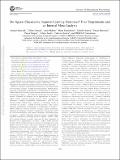Do Jigsaw Classrooms Improve Learning Outcomes? Five Experiments and an Internal Meta-Analysis.

Auteur, co-auteurs
Type de référence
Date
2022Langue de la référence
AnglaisEntité(s) de recherche
Résumé
“Jigsaw” is a peer learning procedure derived from social interdependence theory, which suggests that individuals positively linked by a common goal can benefit from positive and promotive social interac- tions (Aronson & Patnoe, 2011). Although jigsaw has often been presented as an efficient way to promote learning, empirical research testing its effect on learning remains relatively scarce. The goal of the present research is to test the hypothesis that a jigsaw intervention would yield a meaningful effect size (d = .40) on learning outcomes, in 5 randomized experiments conducted among sixth-graders. The jigsaw intervention was compared to an “individualistic” (NExp 1 = 252; NExp 2 = 313) or a “teaching as usual” (NExp 3A = 110; NExp 3B = 74; NExp 3C = 101) approach on the same pedagogical content. Across the 5 experiments, we did not find empirical support for this hypothesis. Internal meta-analytic estimates (ES = .00, 95% CI [ .10, .09]) showed that, overall, the jigsaw intervention did not produce the expected positive effects on learning. The reasons why jigsaw classrooms may not always prove benefi- cial for learning are discussed.Titre du périodique
Journal of Educational PsychologyMaison d’édition
American Psychological AssociationPays d'édition
Etats-Unisp-ISSN
0022-0663e-ISSN
1939-2176Evaluation par les pairs (peer reviewing)
ouiVolume / tome
114Pagination
1461-1476URL permanente ORFEE
http://hdl.handle.net/20.500.12162/5856Document(s) associé(s) à la référence
Texte intégral :
Fichier
Accès
Commentaire
Version
Taille
- Tout ORFEE
- Détail référence



